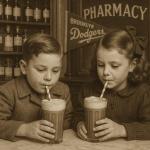National Egg Cream Day is March 15th – a mere 111 days away. Since you can't get started too early with these things, let's get going. But first...
Are you a New Yorka?
New York City
Ebola has come to New York City and Americans continue to worry about t
New York City is now considering putting a ten-cent fee on each plastic bag used by customers, previously provided free o
As most of you know, the New York City Advisory Council on Health Priorities (NYCACHP) is an affiliate of the American Council on Science and Health (ACSH), providing sound scientific information on various public health topics particular to New Y
New York, NY February 1998. In a new report, New York City Public Advocate Mark Green has called lead poisoning a "dire problem" for the city's children.
Scientists associated with the New York City Advisory Council on Health Priorities, a new affiliate of the American Council on Science and Health, have objected to recent claims that the perchloroethlyne, or "perc," emissions from cleaning establi



